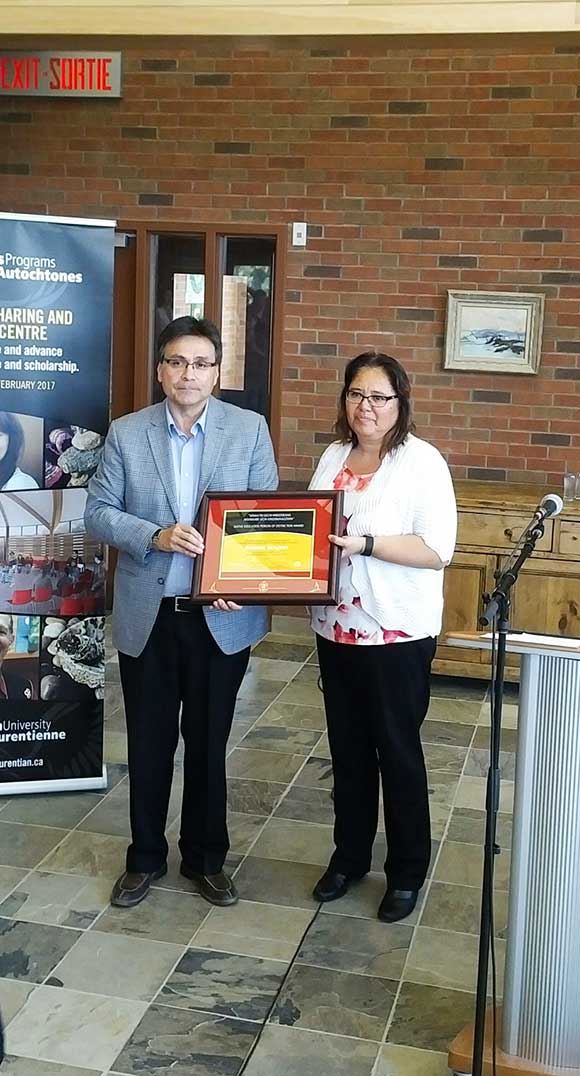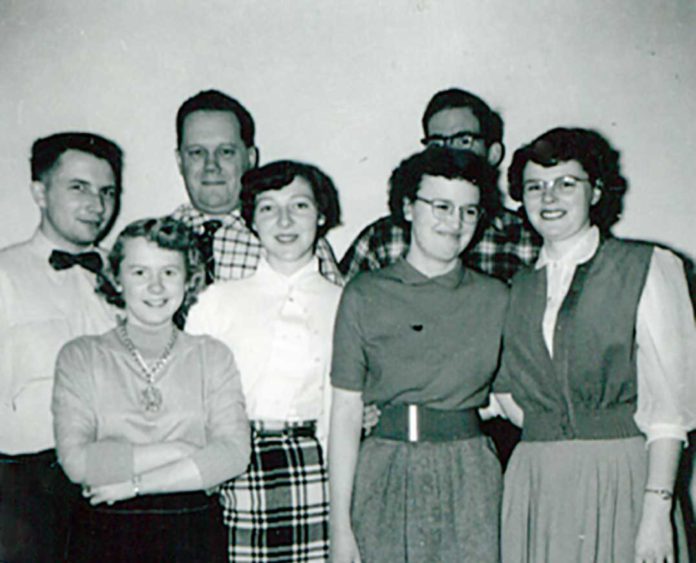SUDBURY—Wikwemikong Board of Education Director of Education Dominic Beaudry was recognized at the June 21 Laurentian University Aboriginal Day celebrations in the Brenda Wallace Reading Room at Laurentian as the Native Education Person of Distinction for his work in fostering Native educational aspiration.
The award is based on a number of criteria that include a demonstrated commitment and contribution in the areas of teaching, research, training and development.
“Clearly, your lifelong work in the field of First Nations education encompasses all of these areas,” reads the letter from Laurentian President Dominic Giroux informing Mr. Beaudry of his selection for the award. “Your devotion, time and effort in advancing First Nations education through supporting the development of programs is to be commended. We are especially grateful for your contribution as chair of LUNEC (Laurentian University Native Education Council) for a number of years as well as being a member of the board of governors here at Laurentian. Your leadership has been valuable in assisting Laurentian University with advancing indigenous education.”
“Aanii, boozhoo, wenboozho kina goyaa gadinminkoonim,” said Mr. Beaudry in accepting the award. “It is a great honour to receive the Native Education Person of Distinction Award the Mnaaj’n Gechi-wiidookang Nishinabe-Gchi-Kinoomaagziwin. It has been a privilege to sit on the Laurentian University Board of Governors over the years and to see the school community grow and flourish as it has with the Living with Lakes Centre, the School of Architecture and the Indigenous Sharing and Learning Centre being constructed as I speak, these are among many projects that have passed through the board recently. There has been so many new facility projects and renovation projects we marvel at the growth and this is all for the students. In order for all schools to fully realize their potential they need to engage all partners and stakeholders and this for us includes the First Nations, Metis and Inuit. The work to ensure inclusiveness for us is through the Laurentian University Native Education Council. We thank the president’s office and the LU Board for providing a mechanism and voice for the FNMI (First Nations, Metis, Inuit) community through this important and vital committee. The LUNEC has done excellent work over the years to ensure education is meaningful for all FNMI students.”
As for his own role, Mr. Beaudry noted, that he has been an “elementary school teacher, high school teacher, high school principal and, his current role as education director. “In order to do my job, I have created working relations with the provincial school boards, colleges, universities, municipalities, the UOI, the COO, the AFN, provincial and federal governments,” he said. “As First Nations we try to maintain strong networking to reach our goals. At our schools in Wikwemikong we graduate students that have gone on to become doctors, lawyers, professors, mechanics, electricians and so on and many of those have come through Laurentian University. In my family alone, my wife, two daughters and son are alumni of this university. So today, in my family, I have a doctor, a nurse practitioner, and a nurse. My dad used to say with all those health professionals you are going to live forever. Further, my son who just completed his degree here at LU, will be attending teachers’ college this fall. At Wikwemikong we are fortunate to have a community daycare, K-12 system, adult education, Contact North for community based post secondary studies and, annually, we fund on average 350 students to attend college and university. So we have an effective system that relies on a local university to fulfill the post-secondary component.”
Part of Wikwemikong’s success, he noted, is that “we have put a strong focus on language and culture and we have created an Anishinabe curriculum department (similar to Scholar’s Choice) where we create Anishinabe education resources for K-12 schools and post secondary programs which we now sell online through our website. So language and culture is quite important to us and for student success. Moreover, a large part of our role for post-secondary students is to advocate for them to ensure they are receiving a meaningful education once they leave our community.”
“FNMI inclusion at the university level has been evolving recently and with the Truth and Reconciliation Commission recommendations we hope to expect positive outcomes in the near future,” continued Mr. Beaudry. “We have been discussing residential schools now for some time, but we need to put the focus back on the underlying reasons they existed. FNMI peoples were not simply victims of benevolence but victims of state and corporate greed. We need to academically review, investigate and research the impacts that those positions have had on our peoples. Moreover, we need to revisit and re-write history. For example, Samuel De Champlain’s evidence from 400 years ago can cast a compelling argument that civilization was much more far advanced than we are led to believe. Through his memoirs and papers we can begin to see the real story. When we read between the lines we begin to see the real First Peoples. We have all heard that evidence suggests that authors have purpose and his purpose was to appeal to his audience and to continue to fund his explorations. So, while he may have seen miles of planted corn fields, potatoes and tomatoes at modern day Cobden and along the Ottawa River, he reports on something completely different. In his report back to France Champlain claims to see hungry savages in need of civilization and Christian enlightenment. Today, we are only just beginning to investigate history through botany and how plant life transformed the world. We now know that the indigenous crops of the New World transformed Western Europe into a modern agrarian society which later led to the Industrial Revolution. Truth is, Western Europe needed corn and potatoes from the indigenous New World to add to the four staple foods wheat and rice to change their world forever. Reconciliation should be about truth and putting indigenous knowledge at the fore front. University is about truth we arrive at it through academic evidence. We hope to find truth so all students can have a meaningful impact through continued positive education opportunities. Today, we have staff that can move this forward and I am so excited about the future.”
In his closing remarks, Mr. Beaudry noted that “as we continue to advocate for meaningful education at Laurentian University we have seen some successes. The Masters of Indigenous Relations Program, the Indigenous Sharing and Learning Centre and a growing indigenous faculty are examples as we move forward. More recently, the communities have expressed an interest in a degree in Native language (or a minor) and this has been part of future planning. It has been a pleasure to a part of LUNEC, the Academic Planning Committee, Research and Ethics Committee, Planning Committee and the Laurentian University board of governors. I have gained immense knowledge through networking with colleagues at LU over the years.”




